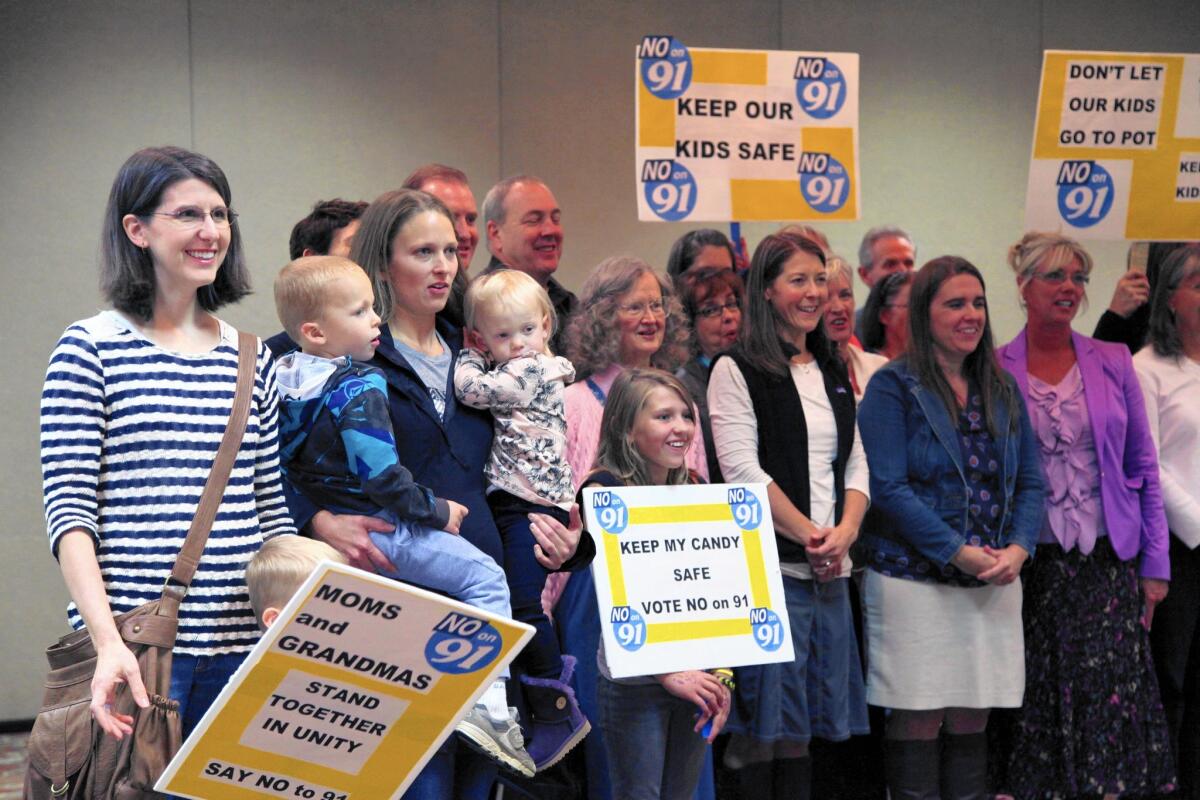Outlook for states’ pot legalization measures goes from solid to shaky

With pot sold openly to any adult who wants it in Colorado and Washington state, marijuana advocates were hoping restrictions in other states would fall like dominoes this election season, opening the way for a push in Congress to change federal drug laws.
They were not anticipating a multimillion-dollar wager against them by a casino mogul. Or a spike in voter anxiety amid bureaucratic stumbles in regulating the nascent recreational pot market. Or an unfortunate cellphone video from a rowdy frat bar called Boots N Buckles.
Now, legalization measures are teetering in Florida, Oregon and Alaska, states where supporters were confident of victory only a few months ago. It’s all enough to seriously harsh the mellow of pro-pot advocates.
“This is turning out to be a unique and very difficult election year,” said Aaron Houston, a strategist for the Ghost Group, a marijuana-focused investment company. Ballot measures, he said, are under stress from the same midterm challenge afflicting all political forces on the left and their causes: an uninspired base of voters.
But advocates acknowledge that some voters are also wary of how legalization has worked in Colorado and Washington. Legalization has not set off crime sprees in those states or a surge in stoned drivers crashing on roadways, as opponents had warned, but there have been plenty of less-than-favorable headlines about marijuana-infused candies and sodas and tourists going on drug binges.
And, unlike in previous campaigns, opponents of legalization this year have the money to make sure voters hear about those problems. The funds come from the unexpected emergence of a new and deep-pocketed nemesis for legal pot: Sheldon Adelson, the billionaire chief of Las Vegas Sands Corp.
Adelson, who ranks alongside Charles and David Koch in the magnitude of money he invests in conservative politics, has spent $5 million to thwart what had been considered a routine medical marijuana proposal in Florida, surprising not just the measure’s supporters but its delighted opponents too.
The police organizations, drug treatment doctors and public health advocates who have banded together in the past to fight legalization efforts have never seen so much cash.
“This is totally unprecedented,” said Kevin Sabet, co-founder of Project SAM, a national anti-marijuana group. “There has never even been a TV ad from the ‘no’ side before.”
“The fact that Colorado and Washington have passed legalization has helped our argument,” Sabet said. “We point at their example. We ask the teacher in Eugene if they want to deal with what the teacher in Denver is dealing with, with marijuana candies brought to school.... We can ask the minority rights advocate in Alaska whether they think it is fair that all these marijuana stores are concentrated in minority neighborhoods in Washington and Colorado.”
In Florida, the Adelson-backed opposition has mounted a sophisticated, multimedia onslaught, raising doubts among seniors, in particular, by comparing medical marijuana dispensaries to “pill mills” that wantonly distribute dangerous prescription drugs. Once significantly ahead in polls, the measure, Amendment 2, now appears unlikely to hit the 60% threshold it needs for passage.
“Florida is the beginning of what will be a broader effort nationwide,” said Andy Abboud, Adelson’s chief political strategist. He said Adelson and his wife, Miriam, a physician specializing in drug addiction, seek to “counterbalance the mainstreaming of marijuana in the country.”
For them, it is personal, Abboud said. Adelson’s son from a previous marriage died of a drug overdose.
The billionaire’s involvement in Florida came at the behest of his friend Mel Sembler, a major GOP donor and former ambassador to Italy who runs a Florida-based network of drug treatment facilities that have attracted controversy for alleged harsh tactics with patients. Sembler and his wife, Betty, went to the Adelsons “and made a personal plea,” Abboud said. “They can be very persuasive.”
As the Adelson money flowed, the campaign to legalize medical marijuana in Florida suffered another setback when a video of Amendment 2’s chief sponsor, a wealthy, well-connected trial lawyer named John Morgan, went viral on YouTube. In it, Morgan, drink in hand, clearly inebriated and cussing with abandon, extolled the virtues of getting high before a rally of rowdy college kids at the Boots N Buckles bar in Lakeland, a central Florida city about halfway between Tampa and Orlando.
“He self-destructed in public view,” said David Colburn, director of the Bob Graham Center for Public Service at the University of Florida. The center’s latest poll shows support for the proposal has dipped to 48%.
“This is a serious issue which requires a serious discourse before people are going to be persuaded,” Colburn said. “Instead, it became a bit of a joke.”
The outlook is brighter, but still dicey, for legalization advocates in Oregon, where voters will decide whether to go the way of their neighbors in Washington and allow the sale of pot for recreational use.
This is a repeat try for pot backers in Oregon, who lost narrowly in 2012. This year, advocates are better organized, have a measure written to appeal more broadly, and are flush with cash thanks to millions of dollars in backing from Drug Policy Action, the political arm of the Drug Policy Alliance, which is funded by billionaire George Soros.
Yet polls show support for the measure hovering just above 50%.
“It is closer than we would like,” said Ethan Nadelmann, executive director of the alliance.
Oregon is a crucial state for legalization supporters, who hope to see marijuana available for sale to adults up and down the West Coast by 2016. GOP-dominated Alaska is also considered a prize as organizers seek to enlist more Republicans in their crusade. But polls, while notoriously unreliable in Alaska, generally show the measure falling short.
Regardless of what happens next week, organizers believe they are positioned for big wins in 2016, a presidential election year, which typically brings out an electorate that is younger and more liberal, Nadelmann said.
This year, though, is proving to be difficult.
“We’re dealing with a tough mood in the country right now with Ebola and ISIS and the big drop in the stock market,” Nadelmann said. “It puts a drag on things. People are not in a forward-thinking state of mind. They are more wary of change.”
Twitter: @evanhalper
More to Read
Start your day right
Sign up for Essential California for news, features and recommendations from the L.A. Times and beyond in your inbox six days a week.
You may occasionally receive promotional content from the Los Angeles Times.







